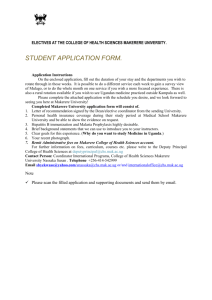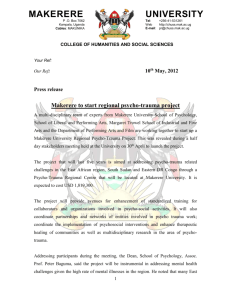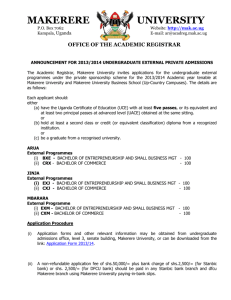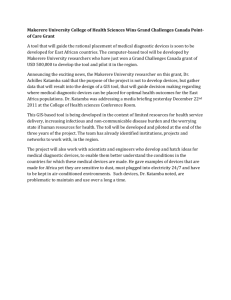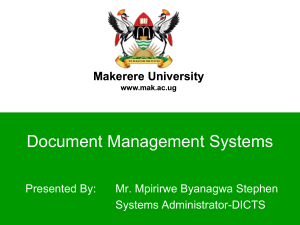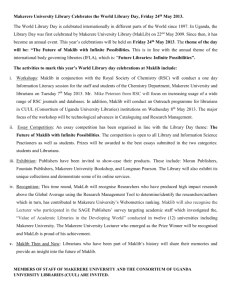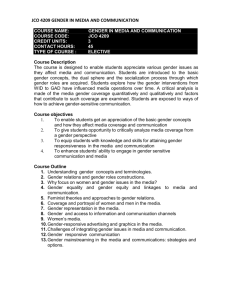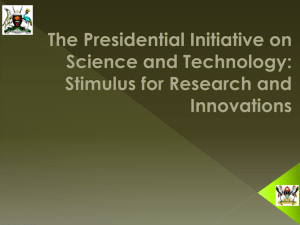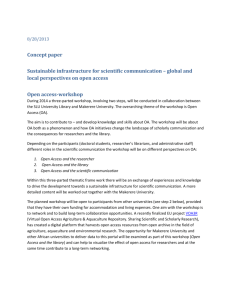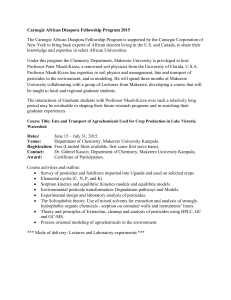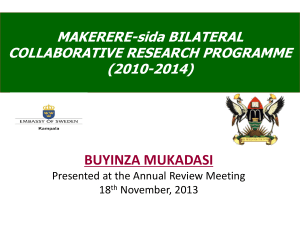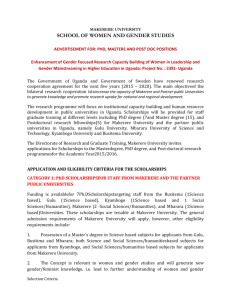medical student application form - Makerere University College Of
advertisement
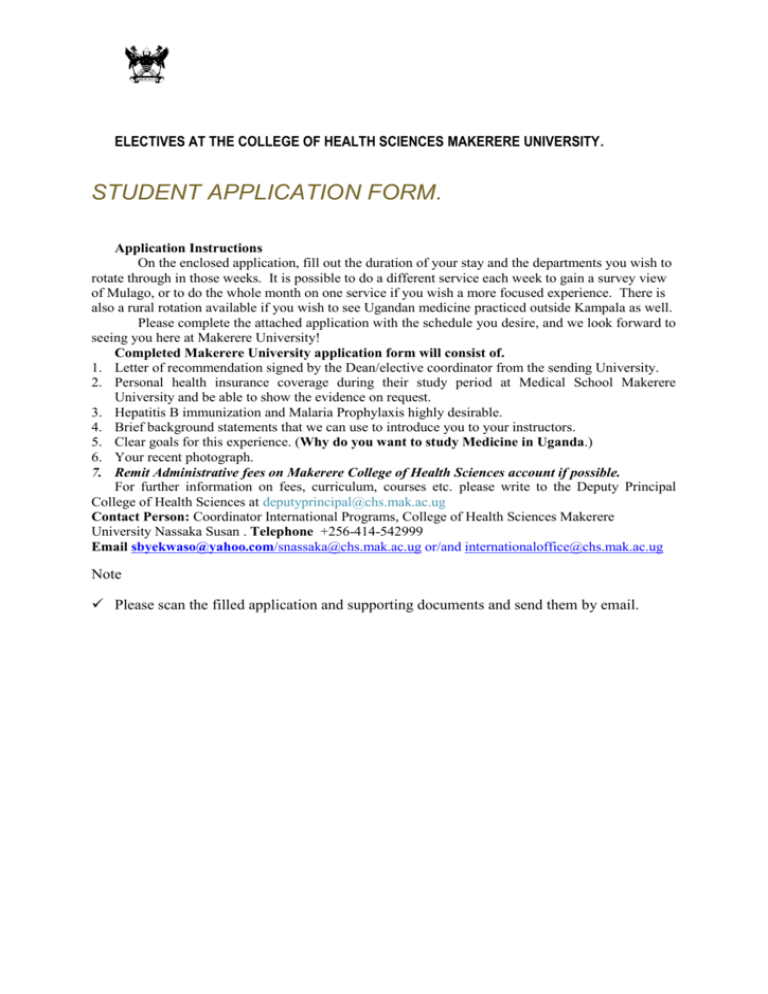
ELECTIVES AT THE COLLEGE OF HEALTH SCIENCES MAKERERE UNIVERSITY. STUDENT APPLICATION FORM. Application Instructions On the enclosed application, fill out the duration of your stay and the departments you wish to rotate through in those weeks. It is possible to do a different service each week to gain a survey view of Mulago, or to do the whole month on one service if you wish a more focused experience. There is also a rural rotation available if you wish to see Ugandan medicine practiced outside Kampala as well. Please complete the attached application with the schedule you desire, and we look forward to seeing you here at Makerere University! Completed Makerere University application form will consist of. 1. Letter of recommendation signed by the Dean/elective coordinator from the sending University. 2. Personal health insurance coverage during their study period at Medical School Makerere University and be able to show the evidence on request. 3. Hepatitis B immunization and Malaria Prophylaxis highly desirable. 4. Brief background statements that we can use to introduce you to your instructors. 5. Clear goals for this experience. (Why do you want to study Medicine in Uganda.) 6. Your recent photograph. 7. Remit Administrative fees on Makerere College of Health Sciences account if possible. For further information on fees, curriculum, courses etc. please write to the Deputy Principal College of Health Sciences at deputyprincipal@chs.mak.ac.ug Contact Person: Coordinator International Programs, College of Health Sciences Makerere University Nassaka Susan . Telephone +256-414-542999 Email sbyekwaso@yahoo.com/snassaka@chs.mak.ac.ug or/and internationaloffice@chs.mak.ac.ug Note Please scan the filled application and supporting documents and send them by email. 1 ELECTIVES AT THE COLLEGE OF HEALTH SCIENCES MAKERERE UNIVERSITY. ACADEMIC YEAR ……………. Photo FIELD OF STUDY: Medicine SENDING INSTITUTION Home Institution: …………………………………………………………………………………… Elective coordinator (contact person) in home institution. Name…………………………………………………………………………… E-mail ………………………………………… Telephone…………………………… Fax : ……………………………… Emergency contact in home country. STUDENT’S PERSONAL DATA Family name: ………………………………… First name (s): ……………………………………….. Date of birth: ………………………………….. Sex: …………………………………………………. Place of Birth: ……………………………….. Nationality: ………………………………………… Current address: ………………………………. Permanent address (if different): …………………… ………………………………………………………… ……………………………………………………….. …… Tel.: …………………………………………………. Current address is valid until: ……………….. E-mail: ……………………………………………… HEALTH INSURANCE Insurance company Insurance number and validity 2 PROPOSED FIELD OF STUDY PROGRAM AT THE COLLEGE OF HEALTH SCIENCES Write according to the order of choice- Please fill this part. Program Pharmacy Medicine Course title/Subject (see next page for choices available) Rotations must begin on Monday. Please specify dates and order of priority. ADDITIONAL INFORMATION ……………………………………………………………………………………………… ………………………………………………………………………………………………………………… ……………………………………………………………………………………………………………………… … Student’s signature Date and Place Sending institution We confirm that the proposed program of study is approved ………………………………………. Elective coordinator ………………….. Date and Place. Clinical rotations. The suggested minimum duration of clinical rotations is 2 weeks. The application has to go through the international liaison office in the Dean’s offices. The departments will determine whether they accept a student or not. Please mention on the application form a 2nd and 3rd choice in case 1st choice cannot be met because of capacity problems. (Please choose from these units) Possible available rotations. 1. INTERNAL MEDICINE o Cardiology. o Infecticious Diseases o Gastroenterology. o Endocrinology o dermatology nephrology o Endocrinology o Rheumatology o Haematology/ oncology o Neurology 3 3 o Emergency Medicine (Casualty) 2. PAEDIATRICS. o Acute care unit (Emergency ward) o Special care unit ( Neo-nates) o Nutritional Unit (Mwanamugimu). o Sickle cell clinic o General Paediatric 3. o o o o o o o o o o SURGERY E.N.T Neurosurgery Ophthalmology Urology Card thorax Dentistry Paediatrics Orthopaedics General Surgery Plastic surgery 3. OBSTETRICS AND GYNAECOLOGY. o Obstetrics o Gyneacology. 4. PSYCHIATRY. o Mulago Hospital o Butabika Hospital 5. Anaesthesia o Perioperative care o Chronic Pain o Intensive care medicine o Research in obstetrics Anaesthesia kwizera.arthur@gmail.com) (Contact person Dr. Arthur Kwizera – 6. Dentistry 7. Pharmacy 8. Radiology o Ultra Sound. o Plain Radiology o Interventional Radiology o Radiotherapy o Clinical imaging based on systems e.g. Respiratory, Gastroenterology o Breast imaging. 9. Community Based Education and Services (COBES). Community Based Education and Services (COBES) is an off campus service learning which combines educational and service objectives and provides real life experiences for students. Students are posted for community internships in various hospitals and health centres ranging from District (General) hospitals, missionary hospitals, private hospitals, health centre III, health centre IV and private medical centres through out the country. Students participate in facility and community activities as guided by the medical officer at the health centre. 4 4 Appendix I Guidelines for Research Proposals for approval of research to be carried at the College of Health Sciences Makerere University The following guidelines and standards are required of all research proposals to be forwarded to the School of Medicine College of Health Sciences. 1. A letter from the sending Faculty/Institute confirming institutional review, and ethical approval 2. Inclusion of at least one supervisor/co-investigator from the College of Health Sciences. 3. The proposal should have the following format: i) Title/Topic ii) Background/Introduction iii) Research Problem/Statement of the Problem. a. Presents the reason behind the proposal i.e what will change when this research is done or what would happen if the research was not done. b. Problem is an existing negative state not absence of a solution. c. Refers to what has been detected and needs a solution in the practical or theoretical world. d. Should clearly state that the nature of the problem and its known or estimated magnitude/extent. e. Link the problem to the national development priorities/framework (NDP), the regional (e.g AIU) and the Global Development Agenda (MDG’s). f. Should be concise and brief (not more than 1 page) iv) General Objectives/Aim/Purpose v) Refers to the general intention of the research. Should spell put what the research is supposed to accomplish. Specific Objectives vi) These are specific aims/objectives arising directly from the general objective/purpose/aim of the study. For each specific objective you must have a method to attempt to achieve. Significance/Importance/Contribution. vii) This refers to the relevance of study in terms of academic contribution and practical use that might be made of the findings. It should reflect on knowledge, creation, technological or socio-economic value to the community Justification/Rationale (Answers the question- Why) viii) Would the world collapse if this work is not done? Theoretical/Conceptual framework a. Theoretical framework b. Conceptual framework ix) Scope: The scope provides for the boundary of the research in terms of depths, content and sample size, geographical, Time frame and theoretical coverage. 5 5 x) Literature Review a. This section deals with the analysis of existing literature on the subject with the objective of revealing contributions, weaknesses and gaps. b. The literature review should be according to the themes and should reflect objectives, hypotheses, methods and research questions. c. Citations should be in accordance with approved format xi) Hypotheses/Research questions These are investigative assumptions, which guide the study. In case of hypotheses, they should be tested. xii) xiii) xiv) xv) xvi) xvii) xviii) xix) xx) xxi) xxii) Methodology This is detailed description of selected methodology and should be presented in unambiguous terms. This section comprises: a) The research design b) Research approaches –Qualitative/Quantitative c) Description of geographical area and where the population of the study exists. d) Description of the population from which samples will be selected. e) Sampling strategies by which the researches will select representative elements/subjects from the population. f) Data collection control, which refers to reliability and validity of instruments. g) Measurements, which refer to the formulae or scales in the study h) Data analysis, which involves organization and interpretation of data generated. i) Planned analysis of results. Ethical considerations, including consent/assent from your study subjects and their protection from harm. Environmental considerations. Gender consideration Limitation/anticipated problems References Appendices Budget This is the financial plan for implementation of the research. It should be clear, realistic and reasonable (affordable) Time framework/Work Plan Explanatory notes Instruments/tools 6 6 Appendix II : Administrative fees structure 1) 250 USD or its equivalent for 4 weeks or less. 2) 500 USD or its equivalent for students staying for more than 6 weeks. 3) 250 USD or its equivalent for residents. Payment of administrative fees. Option 1 : Remit the money on Makerere University College of Health Sciences Research before you arrive. Details of the account. DOLLAR ACCOUNT Bank: Stanbic Account (U) Ltd Branch: Crested Towers Branch Title : Makerere University College of Health Sciences Research. ACCOUNT NO: 0240059133501 BANK SWIFT CODE: SBICUGKX Option 2 Pay the equivalents of the funds in either USD dollars or its equivalent in Ugandan shillings. Note: Please make sure you pay all the fees during the first week and clear all payments before departure. 7 7 Appendix III Housing recommended by College of Health Sciences Guest house Location Single RM (Per day) 1) Makerere Guest House Prices are per day and in US dollars (Breakfast inclusive) 2) Mulago Guest House Email:nelsonobote@yahoo.c Mak. University main campus Mulago Hospital Complex om Double room (single ocupancy) US$45. Wireless internet 60,000 Inclusive of breakfast US$55 per day Wireless internet 100,000 Double room (double occupancy) US$ 40 Wireless internet Email: lucpalia@gmail.com 4) Human Rights and Peace Centre Email: gnakasi@law.mak.ac.ug 5) NUFU House 6) Bukoto Flat US$ 20 Wireles s internet 80,000 Inclusive of breakfast Inclusive of breakfast Prices are per day and in UG shillings. 3) Edge House No. 37 Dorm Rm Mak. University US$15 US$15 US$15 Faculty of Law Mak. University US$ 45 US$ 45 US$ 22 Mak. University US$ 26 US$ 32 US$ 32 Bukoto US$45 120,00 0 Triple occupancy US$15 US$15 Bank details : DOLLAR ACCOUNT BANK: STANBIC ACCOUNT (U) LTD BRANCH: CORPORATE BRANCH TITLE OF THE ACCOUNT: MAKERERE UNIVERSITY COLLEGE OF HEALTH SCIENCE RESEARCH ACCOUNT NO: 0240059133501 BANK SWIFT CODE: SBICUGKX 8 8 9 9
